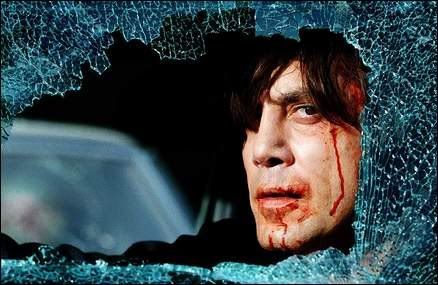
Michael Chabon calls the novel "halfhearted" and says that even lovers of McCarthy must set it aside. Anthony Lane compares it to Elmore Leonard's crime novels, but (wittily, I'll admit) writes that "if I want Leonard, I’ll take him neat, rather than slow-filtered, drop by drop, through a layer of Faulkner, then laced with the Book of Jeremiah." James Wood calls it "an unimportant, stripped-down thriller."
They're right, mostly, though Wood is wrong when, in praising the novel’s dialogue, he writes that it is “so good that we can confidently expect the Hollywood version to excise it.” The Coen brothers didn’t excise it, of course (then again, I guess they aren’t Hollywood, properly speaking).
Maybe that's the thing to admire about this book, which is one of McCarthy's lesser efforts: it is rendered so clearly that the Coen brothers could make a great movie out of it. Everything that’s in the movie is in the book: the dread, the landscape, the dialogue, the weirdness. The film is a testament to the Coens’ attention to detail and skill in realizing a cinematic vision. It must be said too that the parts they cut from the novel—a female hitchhiker that Llewelyn has some heart-to-hearts with before he is killed; the greater part of the half-baked epilogue that tries to develop Sheriff Bell’s character further and lend the story greater signficance—are not great losses. But it’s also a testament to McCarthy’s abilities to create these indelible images, characters, and events.
They're right, mostly, though Wood is wrong when, in praising the novel’s dialogue, he writes that it is “so good that we can confidently expect the Hollywood version to excise it.” The Coen brothers didn’t excise it, of course (then again, I guess they aren’t Hollywood, properly speaking).
Maybe that's the thing to admire about this book, which is one of McCarthy's lesser efforts: it is rendered so clearly that the Coen brothers could make a great movie out of it. Everything that’s in the movie is in the book: the dread, the landscape, the dialogue, the weirdness. The film is a testament to the Coens’ attention to detail and skill in realizing a cinematic vision. It must be said too that the parts they cut from the novel—a female hitchhiker that Llewelyn has some heart-to-hearts with before he is killed; the greater part of the half-baked epilogue that tries to develop Sheriff Bell’s character further and lend the story greater signficance—are not great losses. But it’s also a testament to McCarthy’s abilities to create these indelible images, characters, and events.
No comments:
Post a Comment